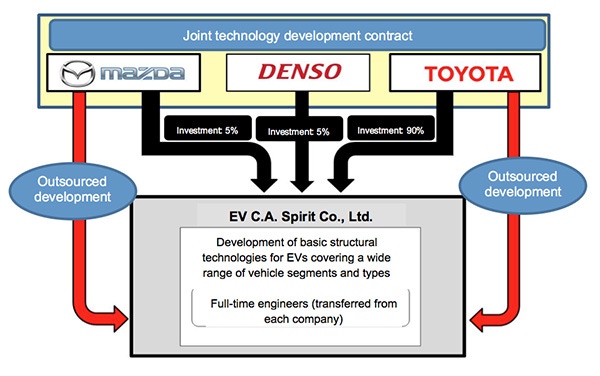Toyota, Mazda, Denso Team Up to Develop EV Technology
Toyota, Mazda, and Denso will create a common architecture for EV components in cars and light trucks.
October 4, 2017

Longtime electric vehicle holdout Toyota Motor Corp. announced last week it is partnering with Mazda Motor Corp and automotive supplier Denso Corp. to form a new company to develop EV technologies.
Known as EV Common Architecture Spirit Co., the new entity will employ 40 and will focus on researching the characteristics that define optimum performance of EVs. In a formal statement, the companies said their “agreement covers a diverse range of models, from minivehicles to passenger vehicles, SUVs and light trucks.”
|
Denso, Mazda and Toyota will form a new company to create a “common architecture for electric vehicles. Toyota will hold a 90% stake in the company. (Source: Denso Corp.) |
Toyota has long contended that battery-electric cars aren’t favored by consumers, but to some extent it may now be changing its mind due to China’s hard push into the electric car market. In 2016, Chinese consumers bought nearly half of the plug-in vehicles sold globally.
“Electric vehicles may not be in the mix for the US, but they may be in the mix in China or Europe or elsewhere,” Toyota spokesman Aaron Fowles told Design News this week. “So if it does turn that way, we have to be prepared.”
Together, the three companies plan to leverage their strengths -- Mazda’s computer-modeling, Denso’s electronic technologies, and Toyota’s New Global Architecture Platform. Although the companies are saying little about their joint effort, it is known that they are creating a “commonized architecture” that could be applied to any vehicle, regardless of class or power. That strategy could include common forms of electric and electronic components, and common performance characteristics, such as voltages and currents.
“By organizing component characteristics, various products can be developed and produced through the same process,” the companies said in a vaguely-worded statement.
Late last year, Mazda announced that it plans to start selling electric vehicles in 2019, mostly as a way of accommodating ZEV regulations in the US. Similarly, Toyota said last year it, too, intends to take a harder look at BEVs. Since 2015, the two automakers have talked about a partnership to enable them to share the high costs of development, but they did not make a formal announcement until last week.
Toyota said it will have a 90% stake in the new company, while Mazda and Denso have 5% each. Toyota and Mazda also recently announced plans to jointly build a $1.6 billion plant in the US.
The partnership is consistent with a growing trend in the auto industry. It was announced just days before GM said it will produce 20 new pure electric cars by 2023, and Ford declared that it is forming an internal unit called Team Edison to accelerate the development of electric cars.
Toyota said its acceptance of electric cars is a natural, given the changes in the global marketplace. “We’ve always said that it’s not up to us to make a powertrain and force it on the market,” Fowles told us. “Ultimately, consumers decide what’s right for their lifestyle, or governments decide what’s appropriate for their country.”
Senior technical editor Chuck Murray has been writing about technology for 33 years. He joined Design News in 1987, and has covered electronics, automation, fluid power, and auto.
Code Quality Is Key to Securing the Connected Car
Join Jay Thomas, director of field engineering for LDRA, as he discusses the vulnerabilities of connected automobiles at the upcoming
About the Author(s)
You May Also Like




